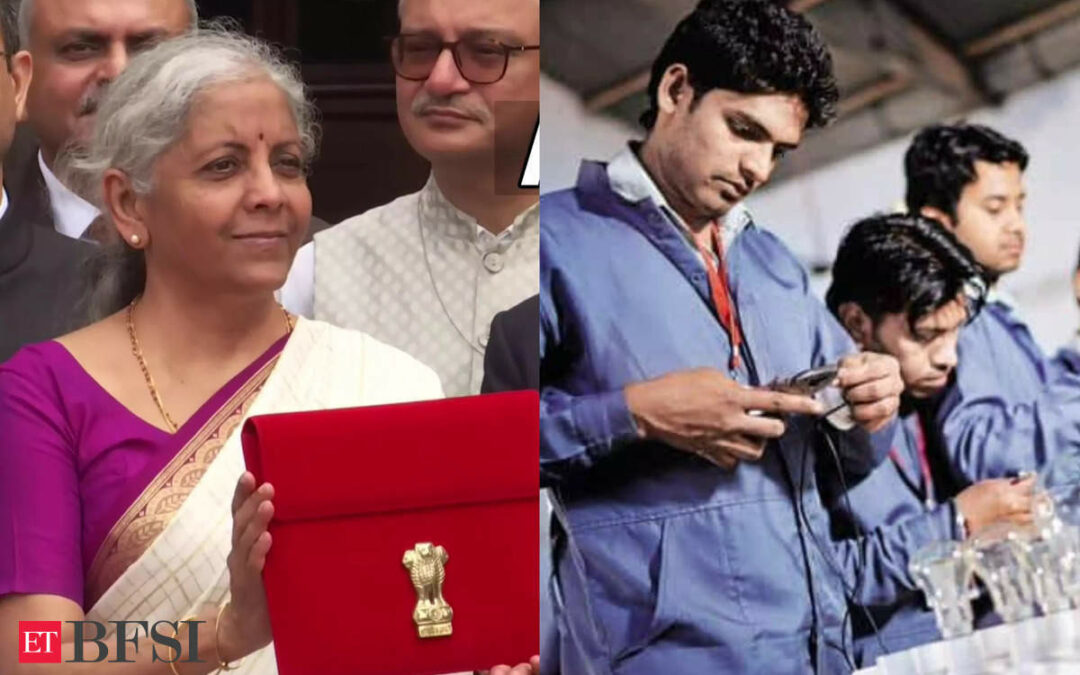Union Budget 2024 updates: Union Finance Minister Nirmala Sitharaman on Monday, July 22, announced a significant allocation of ₹1.48 lakh crore in the Budget for FY25, focusing on education, employment, and skill development. This move underscores the government’s commitment to enhancing the employability of India’s youth and addressing the skill gap in the modern economy.
The FM announced employment-linked skilling through schemes as part of the PM’s package. These schemes will be based on enrolment in the EPFO, focusing on recognizing first-time employees.
First-timers will receive one month’s wage upon entering the workforce in all formal sectors. A direct benefit transfer (DBT) of one month’s salary, up to Rs 15,000, will be provided in three instalments. The eligibility limit for this benefit will be a salary of Rs 1 lakh per month, and it is expected to benefit 2.1 lakh youths.”
The government also announced financial support for loans up to Rs 10 lakh for higher education.
Sixty-five percent of India’s rapidly growing population is under 35, yet many lack the skills required by today’s industries. According to the Economic Survey 2024, approximately 51.25% of the youth are deemed employable, marking an improvement from around 34% a decade ago. However, this still means that nearly one in two graduates are not immediately job-ready.
The survey also highlighted positive trends in the labor market, with unemployment rates declining to 3.2% in 2022-23. Increased youth and female participation in the workforce presents an opportunity to harness India’s demographic and gender dividends. Furthermore, the net payroll additions under the Employees’ Provident Fund Organization (EPFO) have more than doubled in the past five years, indicating robust growth in formal employment.
As artificial intelligence increasingly influences various economic sectors, balancing technology deployment and labor utilization is crucial. The government emphasizes the potential of agro-processing and the care economy as key areas for generating and sustaining quality employment.
The rise in candidates undergoing skill development through the government’s flagship programs, such as ‘Skill India,’ highlights the concerted effort to improve employability. However, regulatory barriers, such as land use restrictions and building codes that limit women’s employment, must be addressed to boost employment and raise women’s labor force participation rates.
Key Priorities and Updates
Finance Minister Sitharaman outlined nine priorities in the Budget aimed at generating ample opportunities for all, including:
Productivity and Resilience in Agriculture
Employment and Skilling
Inclusive Human Resource Development and Social Justice
Manufacturing and Services
Urban Development
Emergency Security
Infrastructure
Innovation and R&D
Next-Gen Reforms
These initiatives align with the strategy set in the interim Budget, with subsequent Budgets building on these priorities to further propel India towards ‘Viksit Bharat’ (Developed India).
Speaking ahead of Parliament’s Budget session, Prime Minister Narendra Modi called for an end to political bitterness, urging all parties to participate constructively in discussions for the nation’s betterment. He emphasized the need for a progressive ideology that fuels development and takes the country to new heights.
The Finance Minister also stressed the importance of focusing on the marginalized sectors of society, including the poor, women, youth, and farmers. The extension of the PM Garib Kalyan Anna Yojana for five years, benefiting over 80 crore people, exemplifies the government’s commitment to inclusive growth.
Economic Challenges and Outlook
Despite these positive developments, significant downside risks to growth and upside risks to inflation remain, amid global economic uncertainties. As Sitharaman presents her seventh historic Budget, the government’s proactive measures and fiscal strategies aim to mitigate these challenges and sustain India’s growth trajectory.
In conclusion, this Budget reflects a comprehensive approach to fostering education, employment, and skill development, crucial for India’s economic future. The government’s continued focus on creating a business-friendly environment, coupled with strategic investments in human capital, aims to drive the country towards sustained high growth rates and inclusive development.











